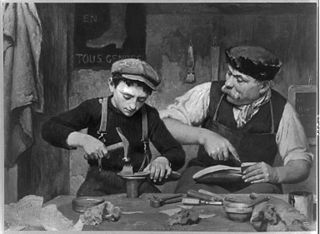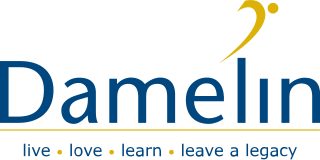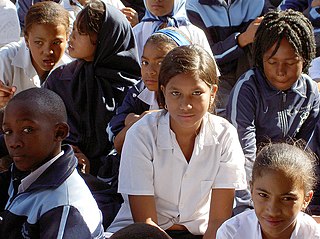Related Research Articles

Education in Australia encompasses the sectors of early childhood education (preschool) and primary education, followed by secondary education, and finally tertiary education, which includes higher education and vocational education. Regulation and funding of education is primarily the responsibility of the States and territories; however, the Australian Government also plays a funding role.

Vocational education is education that prepares people for a skilled craft as an artisan, trade as a tradesperson, or work as a technician. Vocational education can also be seen as that type of education given to an individual to prepare that individual to be gainfully employed or self employed with requisite skill. Vocational education is known by a variety of names, depending on the country concerned, including career and technical education, or acronyms such as TVET and TAFE.

A stockbroker is an individual or company that buys and sells stocks and other investments for a financial market participant in return for a commission, markup, or fee. In most countries they are regulated as a broker or broker-dealer and may need to hold a relevant license and may be a member of a stock exchange. They generally act as a financial advisor and investment manager. In this case they may also be licensed as a financial adviser such as a registered investment adviser.

Apprenticeship is a system for training a new generation of practitioners of a trade or profession with on-the-job training and often some accompanying study. Apprenticeships can also enable practitioners to gain a license to practice in a regulated occupation. Most of their training is done while working for an employer who helps the apprentices learn their trade or profession, in exchange for their continued labor for an agreed period after they have achieved measurable competencies.

The Qualifications and Curriculum Development Agency (QCDA) was a charity, and an executive non-departmental public body (NDPB) of the Department for Education. In England and Northern Ireland, the QCDA maintained and developed the National Curriculum and associated assessments, tests and examinations, advising the minister formerly known as the Secretary of State for Education on these matters.

Damelin is a private college founded in 1943 by Benjamin Damelin. It has 9 campuses in South Africa and is owned by Educor group. Damelin offers degrees, diplomas and other higher qualifications, but is considered a college instead of a university due to the regulations for tertiary institutions in South Africa. Damelin is the oldest and most profitable education subsidiary owned by Educor. By November 2012, over one million students had graduated from Damelin. In March 2024 it was deregistered for non-compliance along with other institutions under the Educor umbrella, CityVarsity, Intec and Lyceum College. The group has been accused by the Minister of Higher Education and Training of "unethical conduct, dysfunctional practices, bribery and other elements of corruption."

Education in South Africa is governed by two national departments, namely the Department of Basic Education (DBE), which is responsible for primary and secondary schools, and the Department of Higher Education and Training (DHET), which is responsible for tertiary education and vocational training. Prior to 2009, both departments were represented in a single Department of Education. Among sub-Saharan African countries, South Africa has one of the highest literacy rates. According to The World Factbook - Central Intelligence Agency as of 2019, 95% of the population aged from 15 and over can read and write in South Africa were respectively literate.
A dual education system combines apprenticeships in a company and vocational education at a vocational school in one course. This system is practiced in several countries, notably Germany, Austria, Switzerland, South Tyrol and in the German-speaking Community of Belgium, but also for some years now in South Korea.

Education in Ghana uses a dualistic approach encompassing both formal and informal learning systems. The current formal educational system was introduced during European colonisation. However, learning systems existed prior to that. The University of Moliyili is one of the earliest learning centers in Ghana established in the 1700s. During colonisation, European settlers initially introduced a formal education system addressed to the elites, while education of the average citizen was mainly informal, and based on apprenticeship. Economic activities in pre-colonial Ghana were based on farm produce shared within households and members of each household specialized in providing necessities such as cooking utilities, shelter, clothing, and furniture, and trade with other households was therefore practiced on a very small scale. As such there was no need for employment outside the household that would have otherwise called for disciplines, values, and skills through a formal education system. After colonization, Ghana's economy became a hybrid of subsistence and formal economy.

The Technical Education and Skills Development Authority serves as the Philippines' Technical Vocational Education and Training (TVET) authority. As a government agency, TESDA is tasked to both manage and supervise the Philippines' Technical Education and Skills Development (TESD). Its goals are to develop the Filipino workforce with "world-class competence and positive work values" and to provide quality technical-educational and skills development through its direction, policies, and programs.
The Skills Development Act97 of 1998 is a law enacted in South Africa in 1998.

The South African Qualifications Authority (SAQA) is a statutory body, regulated in terms of the National Qualifications Framework Act No. 67 of 2008. It is made up of 29 members appointed by the Minister of Education in consultation with the Minister of Labour. SAQA is mandated by legislation to oversee the development and implementation of the National Qualifications Framework (NQF).
The South African Liberal Students' Association (SALSA) exists to unify liberal student organisations across South African campuses. SALSA is the ideological descendant of the South African Liberal Association (SALA) (1936–1968), the first non-racial political organisation in South Africa, gathering many of its liberal principles and goals in its founding constitution. SALSA is a student organisation which is not aligned with any political party; and which believes in, practices and promotes the principles of liberal democracy on campuses.
Qualitas Career Academy is a private college in South Africa, with campuses in various provinces. The institution delivers attendance/contact-based tuition in two modalities, namely full-time and part-time. Full-time curriculum is aimed at high school graduates/students acquiring their first qualification. The part-time curriculum centres on skills and knowledge required by those already employed. Training and consultation services are presented to the private and government sector.

College SA is a Distance Learning Private and Business College, located in Tygervalley Bellville, South Africa. College SA offers Business, Technical and Vocational Education and Training (TVET) to students, both in South Africa and internationally.

Regenesys Business School is a private business school based in Johannesburg, South Africa. The Regenesys Group includes Regenesys Business School, Regenesys School of Public Management and Regenesys School of Law. The group has campuses and offices in South Africa, Mumbai, Silicon Valley, Nairobi, and Lagos.
Oxbridge Academy is a private distance learning college based in Stellenbosch, South Africa. It was founded in 1997, to help address the skills shortage in the South African job market. Oxbridge Academy also offers courses to students internationally, but the majority of their students are situated in southern Africa.
TVE refers to all forms and levels of education and which provide knowledge and skills related to occupations in various sectors of economic and social life through formal, non-formal and informal learning methods in both school-based and work-based learning contexts.To achieve its aims and purposes, TVE focuses on the learning and mastery of specialized techniques and the scientific principles underlying those techniques, as well as general knowledge, skills and values.
A qualifications framework is a formalized structure in which learning level descriptors and qualifications are used in order to understand learning outcomes. This allows for the ability to develop, assess and improve quality education in a number of contexts. Qualifications frameworks are typically found at the national, regional, and international level.
In South Africa the Department of Public Enterprises is the shareholder representative of the South African Government with oversight responsibility for state-owned enterprises in key sectors. Some companies are not directly controlled by the Department of Public Enterprises, but by various other departments. Further, not all state owned entities are registered as companies.
References
- ↑ "Learnerships in South Africa". GoCareers.co.za. Retrieved 12 January 2022.
- ↑ "Skills Education Training Authorities. SETA Offices in South Africa". Vocational.co.za. Retrieved 8 February 2014.
- ↑ Erasmus, Barney; Van Wyk, Marius; Schenk, Hans (2004). South African Human Resource Management: Theory & Practice, p. 443. Juta Academic, Cape Town. ISBN 0702158453.
- ↑ "Skills Education Training Authorities. SETA Offices in South Africa". Vocational.co.za. Retrieved 8 February 2014.
- ↑ "Page redirection". Info.gov.za. 18 September 2012. Retrieved 8 February 2014.